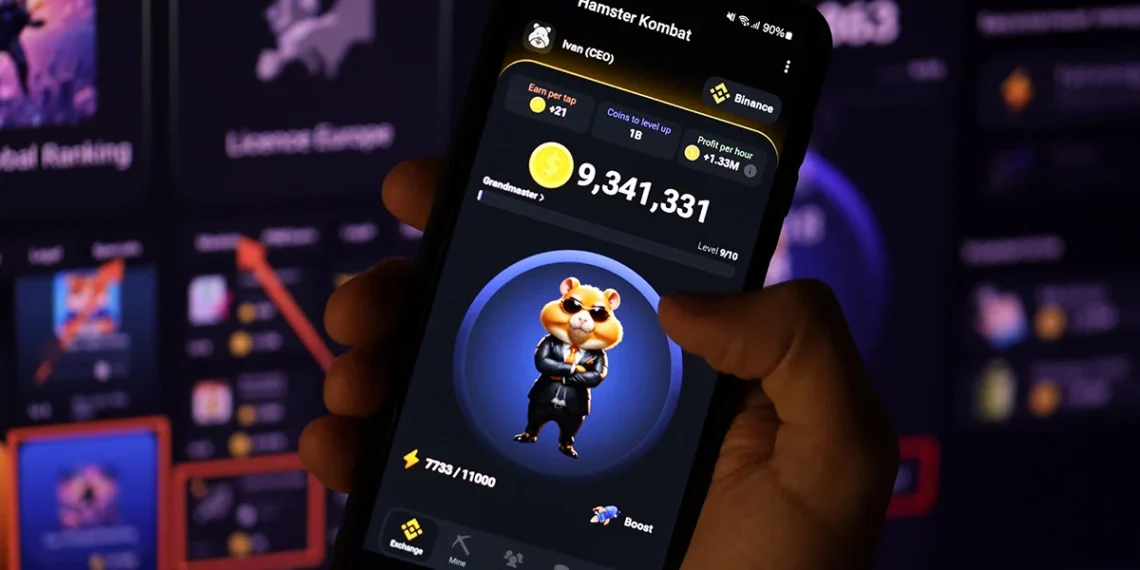Imagine over 300 million people worldwide tapping away on their phones, not for social media, but for a chance at digital wealth. This was the reality with Hamster Kombat, a game that redefined mobile gaming on Telegram. But what goes up must come down, and the fall of Hamster Kombat has left a gaming community in disarray. But how did this simple yet addictive game sparked a mass exodus from Telegram’s gaming scene?
Telegram, with its vast user base of over 900 million, saw an unprecedented opportunity in mini-games. The platform’s instant-play feature eliminated the hassle of downloads, making games like Notcoin and Hamster Kombat immediate sensations.
With blockchain technology integration and with the emergence of The Open Network (TON) , these games promised not just fun but potential financial gain through cryptocurrency airdrops.
Hamster Kombat followed Notcoin’s success, leveraging the tap-to-earn model to attract players with the allure of running their own virtual crypto exchange, albeit with hamsters as CEOs.
The game’s viral spread was fueled by social features like player referrals, daily rewards, and the buzz around cryptocurrency earnings. Hamster Kombat wasn’t just another game; it was a cultural phenomenon.
Players tapped on their screens to earn coins, which could then be invested in upgrades for their fictional exchange, from hiring staff to marketing campaigns, all humorously themed around hamsters.
The game’s community aspect, where players could see leaderboards, compete with friends, and earn by inviting others, created a robust, interactive environment.
At its peak, Hamster Kombat boast of over 300 million players, with Telegram’s CEO Pavel Durov praising it as a potential game-changer for blockchain adoption.
However, like many overnight successes, the shine began to tarnish. Delays in the much-anticipated HMSTR token airdrop and repetitive gameplay mechanics started to wear on the community’s patience.
When the HMSTR token was finally released, its value plummeted, failing to meet the financial dreams it had sparked.
-Governmental and societal scrutiny didn’t make the job easier for Hamster Kombat. Notably, in Iran, Hamster Kombat was accused of being part of a “soft war” by Western powers, diverting attention from national elections.
The fallout from these issues was significant, as Hamster Kombat lost significant players. From a peak of 300 million, the game shed nearly 260 million active users, with the HMSTR token value dropping by 76%.
New games like Paws Mini App capitalized on the vacuum, promising fresh gameplay without the baggage of Hamster Kombat’s missteps, but with very little success.
The social media was rife with disappointment, with players like @CryptoGamerX tweeting, “Hamster Kombat was my daily escape, now it’s just a reminder of what could’ve been.”
Another active player, Blessing Oziwo said; “I regretted all the time I spent tapping and playing Hamster Kombat, the value they promised and what I got was far apart. I am not even sure that I was able to make the money spent on data for the 4 months I played the game.”
As more users express their frustrations over the inability of Hamster Kombat to meet with their expectations, it spirals into avoiding most tap to earn games on Telegram. Investigation shows that most active players were mainly in poor continents like Africa and Asia. Their lack of interest has drastically dropped the players with over 80%.
What led to such a dramatic decline?
-Technical and Design Flaws: The game lacked depth; after the initial excitement, players found the gameplay loop monotonous. The AI-generated graphics, while initially charming, felt lackluster over time.
Read also: Stakeholders seek climate finance, investment mobilisation for agricultural adaptation
-Economic Model: The tap-to-earn model, while intriguing, failed to deliver sustainable value, leading to a token with little real-world utility or value.
– Community and Governance Issues: Controversial player bans and perceived unfair practices in rewards distribution further alienated the community.
The saga of Hamster Kombat offers several takeaways:
– What Can Be Learned: Developers must balance fun with substance, ensuring gameplay remains engaging beyond the initial novelty. Tokenomics should be transparent and sustainable.
– Future of Telegram Games: The platform still holds immense potential for gaming, but there’s a need for innovation in gameplay mechanics and economic models.
– Industry Impact: The fall serves as a cautionary tale for the GameFi sector, highlighting the risks of overpromising and under delivering on financial incentives.
Hamster Kombat rose like a comet in the Telegram gaming sky, bringing with it hope, hype, and a unique blend of humor and finance. Its fall, however, shows the volatile nature of blending gaming with cryptocurrency. As the dust settles, the gaming community looks forward to what might come next, hoping for lessons learned to pave the way for more enduring games on Telegram.






